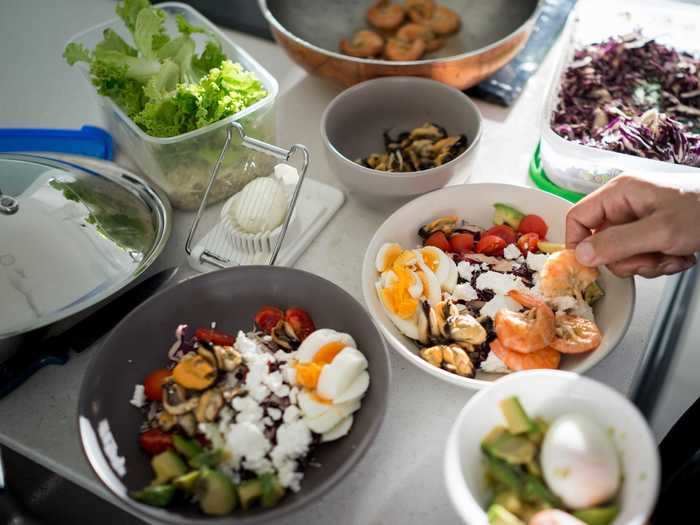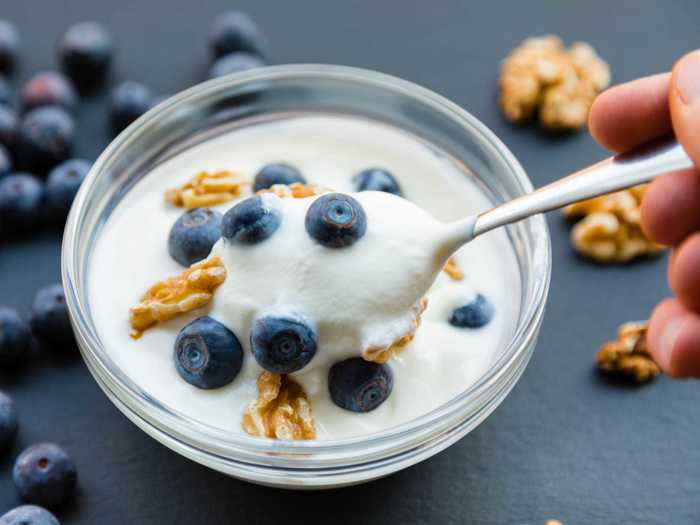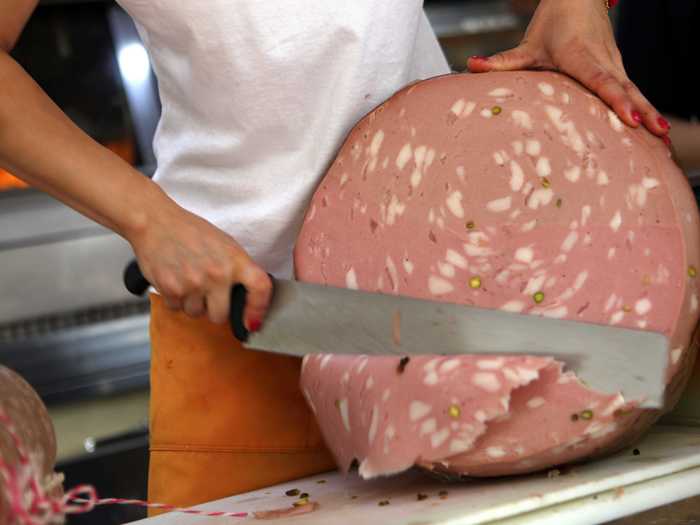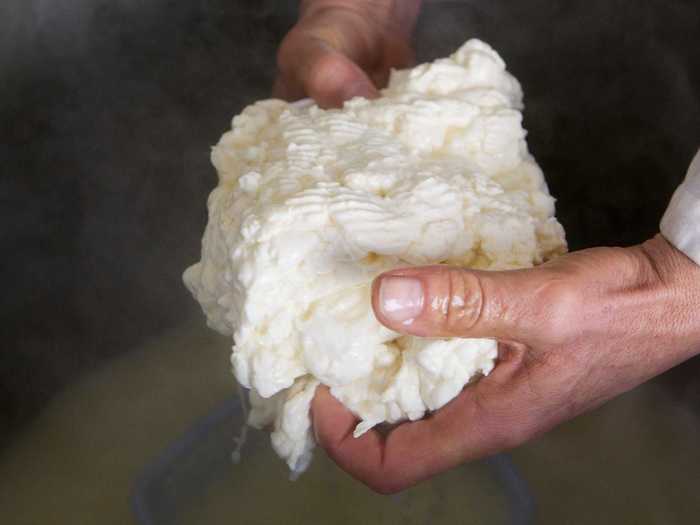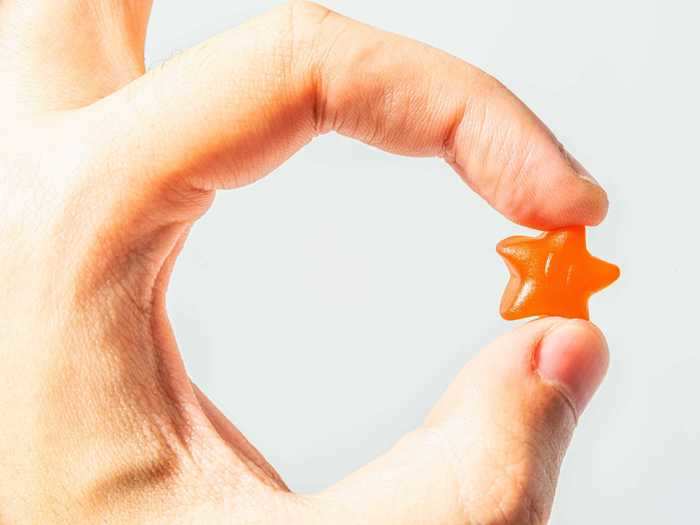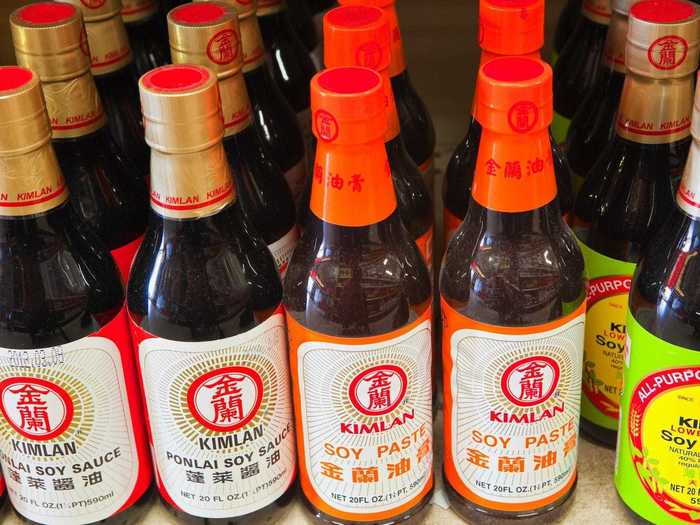Carbs can show up in unlikely places, like cheese, nuts, and processed meats.Jayme Burrows / EyeEm/Getty Images
- Carbohydrates are a major energy source we get from food, and they're in just about everything.
- Sneaky sources of carbs include meats, seafood, dairy, nuts, sauces, supplements, and spices.
- You don't have count carbs, but if you do, know the different between total carbs and net carbs.
When you think of carbohydrates, you probably think of bread, pasta, and sweet treats like cookies or donuts.
But carbs are in a huge range of foods we eat, healthy and otherwise, from sugary pastries to starchy veggies to antioxidant-packed berries and even leafy greens.
Carbs are also a major source of energy.
While carbs are often vilified in current diet trends, they can be highly beneficial, fueling the body and mind, supporting athletic performance, and helping tissues such as muscle recover and grow.
Some people, such as those with diabetes or those doing a ketogenic diet, may opt to cut carbs or avoid them almost entirely.
Whether you love them or hate them, carbs can show up in some surprising places, even after accounting for fiber content.
From spices and sauces to meat products and milk, these are some foods you might not expect to come with carbs.
Small amounts of carbs can add up quickly on a keto or low-carb diet.
Jasmin Merdan/Getty Images
For people who might get 50-60% of their daily calories from carbs, a few extra grams might not seem like a big deal. But for anyone following a keto or low-carb diet, their carb intake might be just 5% to 20% of their daily calories.
That can mean as low as 25 to 50 grams of net carbs per day for a keto diet, and potentially up to 100 grams (of total carbs) per day for a low-carb or carb-cycling diet. For comparison, a small apple contains about 17 grams of net carbs.
That can add up quickly, even when avoiding carb-rich foods like grains, fruits, and legumes.
How do I count carbs?For counting purposes, carbs are typically categorized in two ways:
Total carbs: all the carbohydrates in a food
Net carbs: the total carbs minus the dietary fiber
Since dietary fiber isn't absorbed in the same way as sugars and other simple carbs, it doesn't have the same effect on blood sugar levels. As a result, many people who are limiting carbs don't include fiber in their carb count, and track their net carbs instead.
Some carb sources can contain both, so it's a good idea to check labels if you're not sure.
Some examples include...
Yogurt (even unflavored)
Even without toppings, yogurt has natural sugars.
IGphotography/Getty Images
If you're new to carb cutting, you might assume all animal products are low-carb or even carb-free.
You'd be wrong. Dairy contains natural sugar in the form of lactose.
Yogurt, which is produced by fermenting milk, also needs to have sugar to fuel that fermentation. The friendly bacteria in yogurt eat that sugar, meaning there's less of it in the final product, but some is left over.
Greek yogurt tends to have fewer carbs, since some of the lactose-containing liquids are strained out. Low-fat variations also tend to have slightly more carbs.
Perhaps less surprisingly, flavored yogurts can also carry a hefty carb load, with added fruit, sugar, or other sweeteners. For example:
Protein shakes and bars
Athletes are often encouraged to combine protein and carbs to fuel muscle growth and recovery
MR_BIG_PHOTOGRAPHY/Getty Images
With protein supplements, you might expect to get just what's in the name.
But muscle-building protein shakes often include carbs. This can sometimes come from the sugar content used to give the drinks an appealing flavor, but even low-sugar versions aren't exempt.
That's not necessarily a bad thing, since many people drink these products to refuel after a workout, and carbs are a great energy source for athletes. It is something to be aware of if you're tracking your macros, though. For example:
- Syntha6 protein powder: 15 grams of total and net carbs per serving
- Garden of Life: two to 10 grams total carbs, two to six grams net carbs (depending on type)
- Optimum Nutrition Gold Standard: three grams of total and net carbs
- Muscle Milk: up to nine grams of total carbs, seven grams of net carbs (depending on type)
Protein bars are even more likely to have added carbs because of added ingredients like oats, rice flour, and starches.
- Clif protein bars: 23 grams of total carbs, 18 grams of net carbs
- Luna bars: between 19 to 21 grams of carbs, 17 to 19 grams of net carbs
- Quest bars: 22 grams of total carbs, five grams of net carbs
- RX bars: 23 grams of total carbs, 18 grams of net carbs
Processed meats
Salami and other processed meats can have carbs due to the seasoning, marinading, or curing process.
Photo by David Silverman/Getty Images
Meat may be the last thing you'd expect to contain carbs. But processed meats, including salami, sausages, meatballs and anything that's brined could contain small amounts. That's because these types of meats often have fillers (like breadcrumbs) and flavorings (like sugar).
For example:
Nuts
Nuts contain carbs - mostly fiber, but pistachios and cashews are high in net carbs, too.
101cats/Getty Images
Nuts and seed are a source of healthy fats for any diet. Some of these nutritional powerhouses can pack some carbs, too, including:
- Pistachios: 1/2 cup contains eight grams of total carbs, five grams of net carbs
- Cashews: 1/4 cup contains eight grams of total carbs, seven grams of net carbs
- Peanuts: 1/3 cup contains 14 grams of total carbs, 11 grams of net carbs
- Almonds: 1/2 cup contains 11 grams of carbs, four grams of net carbs
Seafood
Irina Dobrolyubova/Getty Images
Another under-the-radar carb source is seafood — most commonly shellfish, but also squid and octopus.
Like other living animals (including humans), aquatic critters store energy in their bodies as glycogen, a form of glucose or blood sugar. When most animals die, the glycogen in their muscles is depleted.
But it sticks around for shellfish and mollusks, meaning you get a bonus dose of carbs when you eat:
- Mussels: a serving of six contains four grams of total and net carbs
- Oysters: one large, raw oyster contains about a gram and a half of total and net carbs
- Clams: one cup of steamed or boiled clams contains about 10 grams of total and net carbs
- Squid: one cup of steamed or boiled squid contains eight grams of total and net carbs
- Scallops: half a cup of scallops contain three grams of total and net carbs
Milk
Milk is rich in nutrients, including carbs in the form of lactose.
Hollis Johnson/INSIDER
Like yogurt, milk contains natural sugar in the form of lactose.
- One cup of milk contains 13 grams of total and net carbs
- One cup of heavy cream contains six grams of total and net carbs.
That's without added sugar. Variations such as chocolate milk contain even more carbs.
Some cheeses
Hard cheeses like parmesan are low-carb, but softer cheeses like ricotta or cottage cheese do contain carbs.
PhotoAlto/Isabelle Rozenbaum/Getty Images
Where there's dairy, there's lactose, and cheese is no exception. Aged cheeses tend to be fairly low-carb, but cheeses with some liquid have enough milk sugar to have a modest carb count.
Processed cheeses also contain carbs in the form of extra whey, flavorings, or other additives.
- One half-cup of ricotta has nearly nine grams of total and net carbs
- One half-cup of cottage cheese has about five grams of total and net carbs
- One slice of American cheese has about a gram of total and net carbs
Gummy vitamins
Gummy vitamins have been around since the late 1990s.
Hollis Johnson/Business Insider
You might not even count them as a food, but if your daily vitamin regimen includes gummies, that's yet another hidden carb in your life. It often comes in the form of glucose, or pure sugar (so yes, those vitamins are basically candy).
Sauces, marinades, and condiments
Soy sauce can contain carbs from wheat.
Universal Images Group via Getty Images
Finally, it's not just your food that contains carbs — it's important to also pay attention to what you prepare it with. Many condiments, sauces, and even marinades have added sugar or other ingredients that can up your carb total.
- Ketchup: one tablespoon has four grams of total and net carbs
- Balsamic vinegar: one tablespoon contains three grams of total and net carbs
- Barbecue sauce: one tablespoon has six grams of total and net carbs (depending on type)
- Soy sauce: one tablespoon has a bit less than a gram of total and net carbs
- Salad dressing: varies, one tablespoon can have between half a gram to five grams of total and net carbs
Spices
Carbs can also bless your food in the form of seasonings.
Nate LaGasa/Getty Images
Similar to condiments, spices and seasonings often aren't calculated when we consider the nutrients in a meal. These small but mighty ingredients can pack flavor but also a smattering of carbs, in some instances. A few examples are:
- Garlic powder: one teaspoon has about two grams of total and net carbs
- Onion powder: one teaspoon has about a gram and a half of total and net carbs
- Cumin: one teaspoon has just under a gram of total and net carbs
- Paprika: one teaspoon has just over a gram of total and net carbs

